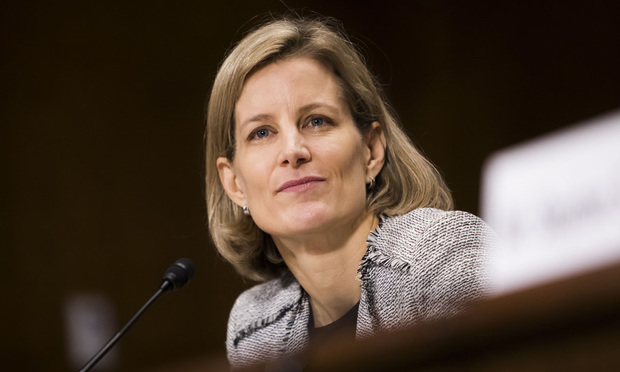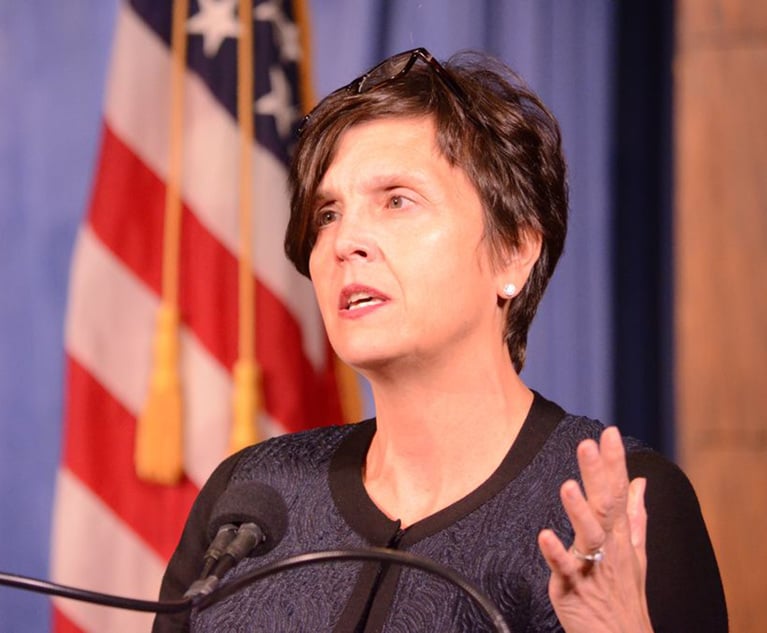'Strong Likelihood' Russian Firm Shirked Subpoenas, DC Trial Judge Says
"At a minimum, by Wednesday, I think you can get an affidavit from a corporate representative," U.S. District Judge Dabney Friedrich of the District of Columbia in Washington told lawyers from Reed Smith, representing Concord Management and Consulting in a Mueller-related case.
March 02, 2020 at 12:28 PM
5 minute read
 Dabney Friedrich testifies before the Senate Judiciary Committee during her confirmation hearing. Photo: Diego M. Radzinschi/ALM
Dabney Friedrich testifies before the Senate Judiciary Committee during her confirmation hearing. Photo: Diego M. Radzinschi/ALM
A federal judge on Monday questioned whether a Russian company had snubbed subpoenas in a case brought by former Special Counsel Robert Mueller III's office, saying there was a "strong likelihood" the firm failed to comply with the document demands ahead of its scheduled trial in April on charges of interference in the 2016 presidential election.
At a half-hour hearing in Washington's federal trial court, U.S. District Judge Dabney Friedrich of the District of Columbia gave the company, Concord Management and Consulting, until Wednesday to either comply with the subpoenas or provide a detailed description of its search for the documents, along with an explanation of why it had not turned over the requested records.
Friedrich called the morning hearing after prosecutors urged her to consider holding Concord in contempt over its failure to produce subpoenaed records, including documents concerning internet protocol addresses and meetings between the company's controlling officer, Yevgeny Prigozhin, and other Russians accused of scheming to sway the 2016 election in favor of President Donald Trump.
Of the 16 Russian defendants charged in the alleged scheme, Concord is the only one who has answered to the accusations in Washington, where the company has hired a defense team from the law firm Reed Smith. Prosecutors have alleged Concord funded an interference operation that featured Russians posing as Americans on social media, in an effort to sow discord within the U.S. electorate.
Addressing Friedrich on Monday, prosecutor Adam Jed declared, "Concord is in contempt," and asked the judge to assess a daily fine to force the company to comply with subpoenas. Friedrich declined to immediately take that step, saying she wanted to give Concord time to explain itself.
It's unclear what effect any civil contempt finding would have on Concord. In an unrelated case, a federal trial judge in Washington imposed a $50,000 daily sanction in 2013 against the Russian government for refusing to return thousands of religious texts. That case remains pending.
On Monday, Reed Smith partner Eric Dubelier defended Concord's efforts to fully respond to the subpoenas, asserting that the company had produced all of the responsive records in its control.
"They produced what they had," he said. "What they didn't have, they didn't produce."
Friedrich appeared skeptical, saying she shared prosecutors' suspicion that Concord had the subpoenaed record in its control. The judge appeared particularly struck by the company's purported inability to turn over records concerning its IP addresses, which allow devices to communicate with each other online.
"I believe there's a strong likelihood that Concord has the documents," Friedrich said, adding that she found it "implausible" that the company could not identify the IP addresses it used.
Dubelier asked to speak with Friedrich privately, in a so-called "ex parte" discussion, saying he had letters explaining why Concord did not possess records regarding IP addresses.
Friedrich refused to hold a private discussion, telling him, "I'm looking for a response on the record." She said Concord needed to have a representative explain the company's efforts to comply with the trial subpoenas.
"At a minimum, by Wednesday, I think you can get an affidavit from a corporate representative," she said.
The deadline drew protest from Dubelier, who noted during the hearing that it was already Monday evening in Russia. Dubelier, who has clashed with prosecutors and Friedrich in court hearings, broadly criticized the judge's handling of Concord's case.
"I'm not going to argue with you about how I'm running my courtroom," Friedrich replied.
At one point, the two sides broached an idea Dubelier has long resisted: Having a representative of Concord come to the United States. Dubelier said the U.S. government would need to provide assurance that the representative would have "free passage," removing the risk of arrest. Jed said the Justice Department was open to working with Concord and the U.S. State Department to facilitate such a trip, but said the government would need the name of the representative.
An affidavit from a Concord representative, he said, was "no substitute for having a live witness" appear in court.
Jed said Concord's response to the trial subpoenas raised broader questions about the extent to which the company was actually participating in its case in Washington. He questioned whether the trial, set to begin in early April, should be delayed.
Dubelier replied that Jed's claims were "outrageous." And he described Jed, a career Justice Department lawyer and former member of Mueller's team, as a "young guy" who lacked experience.
At the close of Monday's hearing, Jed asked whether Dubelier wanted to delay an upcoming hearing in light of the Wednesday deadline for Concord to explain its answer to the trial subpoenas.
"No," he said. "I can walk and chew gum at the same time."
Read more:
'Unwarranted Cheap Shot': Lawyers in Russia Troll Farm Case Feud Over Trial Subpoenas
Mueller's Team Questions How Files in Russia Case Ended Up Online
'Knock It Off': Judge Upbraids Reed Smith Partner Litigating Mueller Case
Tempers Flare at Russia Hearing Over Prosecutor, Defense Phone Call
How Law Firms Are Protecting Sensitive Information in Russia Cases
Reed Smith's Russia Work in Mueller Case Gets Closeup in Court
This content has been archived. It is available through our partners, LexisNexis® and Bloomberg Law.
To view this content, please continue to their sites.
Not a Lexis Subscriber?
Subscribe Now
Not a Bloomberg Law Subscriber?
Subscribe Now
NOT FOR REPRINT
© 2025 ALM Global, LLC, All Rights Reserved. Request academic re-use from www.copyright.com. All other uses, submit a request to [email protected]. For more information visit Asset & Logo Licensing.
You Might Like
View All
Skadden and Steptoe, Defending Amex GBT, Blasts Biden DOJ's Antitrust Lawsuit Over Merger Proposal
4 minute read
'Lack of Independence' or 'Tethered to the Law'? Witnesses Speak on Bondi
4 minute read
Law Firms Mentioned
Trending Stories
- 1Reviewing Judge Merchan's Unconditional Discharge
- 2With New Civil Jury Selection Rule, Litigants Should Carefully Weigh Waiver Risks
- 3Young Lawyers Become Old(er) Lawyers
- 4Caught In the In Between: A Legal Roadmap for the Sandwich Generation
- 5Top 10 Developments, Lessons, and Reminders of 2024
Who Got The Work
J. Brugh Lower of Gibbons has entered an appearance for industrial equipment supplier Devco Corporation in a pending trademark infringement lawsuit. The suit, accusing the defendant of selling knock-off Graco products, was filed Dec. 18 in New Jersey District Court by Rivkin Radler on behalf of Graco Inc. and Graco Minnesota. The case, assigned to U.S. District Judge Zahid N. Quraishi, is 3:24-cv-11294, Graco Inc. et al v. Devco Corporation.
Who Got The Work
Rebecca Maller-Stein and Kent A. Yalowitz of Arnold & Porter Kaye Scholer have entered their appearances for Hanaco Venture Capital and its executives, Lior Prosor and David Frankel, in a pending securities lawsuit. The action, filed on Dec. 24 in New York Southern District Court by Zell, Aron & Co. on behalf of Goldeneye Advisors, accuses the defendants of negligently and fraudulently managing the plaintiff's $1 million investment. The case, assigned to U.S. District Judge Vernon S. Broderick, is 1:24-cv-09918, Goldeneye Advisors, LLC v. Hanaco Venture Capital, Ltd. et al.
Who Got The Work
Attorneys from A&O Shearman has stepped in as defense counsel for Toronto-Dominion Bank and other defendants in a pending securities class action. The suit, filed Dec. 11 in New York Southern District Court by Bleichmar Fonti & Auld, accuses the defendants of concealing the bank's 'pervasive' deficiencies in regards to its compliance with the Bank Secrecy Act and the quality of its anti-money laundering controls. The case, assigned to U.S. District Judge Arun Subramanian, is 1:24-cv-09445, Gonzalez v. The Toronto-Dominion Bank et al.
Who Got The Work
Crown Castle International, a Pennsylvania company providing shared communications infrastructure, has turned to Luke D. Wolf of Gordon Rees Scully Mansukhani to fend off a pending breach-of-contract lawsuit. The court action, filed Nov. 25 in Michigan Eastern District Court by Hooper Hathaway PC on behalf of The Town Residences LLC, accuses Crown Castle of failing to transfer approximately $30,000 in utility payments from T-Mobile in breach of a roof-top lease and assignment agreement. The case, assigned to U.S. District Judge Susan K. Declercq, is 2:24-cv-13131, The Town Residences LLC v. T-Mobile US, Inc. et al.
Who Got The Work
Wilfred P. Coronato and Daniel M. Schwartz of McCarter & English have stepped in as defense counsel to Electrolux Home Products Inc. in a pending product liability lawsuit. The court action, filed Nov. 26 in New York Eastern District Court by Poulos Lopiccolo PC and Nagel Rice LLP on behalf of David Stern, alleges that the defendant's refrigerators’ drawers and shelving repeatedly break and fall apart within months after purchase. The case, assigned to U.S. District Judge Joan M. Azrack, is 2:24-cv-08204, Stern v. Electrolux Home Products, Inc.
Featured Firms
Law Offices of Gary Martin Hays & Associates, P.C.
(470) 294-1674
Law Offices of Mark E. Salomone
(857) 444-6468
Smith & Hassler
(713) 739-1250











